Bildung, Kompetenzen und Arbeitsmarkt
Die Forschungsgruppe erforscht die Entstehung und die Auswirkungen von Kompetenzen. Als wesentliche Bestimmungsfaktoren für die Entwicklung von Kompetenzen untersucht die Gruppe insbesondere den familiären Hintergrund, schulische Bildung und Weiterbildung am Arbeitsplatz. Effekte höherer Kompetenzen auf den Arbeitsmarkterfolg werden über die gesamte berufliche Laufbahn hinweg analysiert. Außerdem beschäftigt sich die Gruppe mit Veränderungen in der Nachfrage nach Kompetenzen infolge von technologischem und strukturellem Wandel.
Forschungscluster
Produktivität und InstitutionenIhr Kontakt

- Abteilung Strukturwandel und Produktivität
Referierte Publikationen
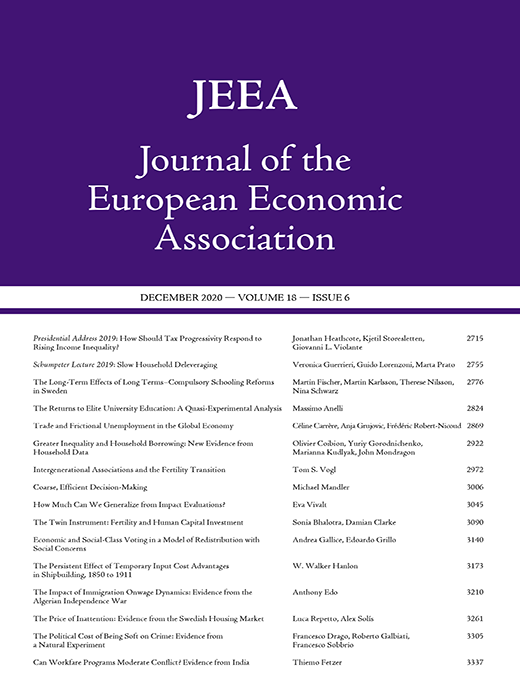
International Emigrant Selection on Occupational Skills
in: Journal of the European Economic Association, Nr. 2, 2021
Abstract
<p>We present the first evidence on the role of occupational choices and acquired skills for migrant selection. Combining novel data from a representative Mexican task survey with rich individual-level worker data, we find that Mexican migrants to the United States have higher manual skills and lower cognitive skills than nonmigrants. Results hold within narrowly defined region–industry–occupation cells and for all education levels. Consistent with a Roy/Borjas-type selection model, differential returns to occupational skills between the United States and Mexico explain the selection pattern. Occupational skills are more important to capture the economic motives for migration than previously used worker characteristics.</p>
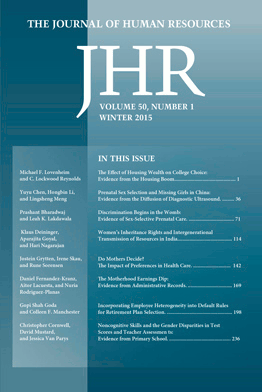
The Value of Smarter Teachers: International Evidence on Teacher Cognitive Skills and Student Performance
in: Journal of Human Resources, Nr. 4, 2019
Abstract
<p>We construct country-level measures of teacher cognitive skills using unique assessment data for 31 countries. We find substantial differences in teacher cognitive skills across countries that are strongly related to student performance. Results are supported by fixed-effects estimation exploiting within-country between-subject variation in teacher skills. A series of robustness and placebo tests indicate a systematic influence of teacher skills as distinct from overall differences among countries in the level of cognitive skills. Moreover, observed country variations in teacher cognitive skills are significantly related to differences in women’s access to high-skill occupations outside teaching and to salary premiums for teachers. </p>

Do Smarter Teachers Make Smarter Students?
in: Education Next, Nr. 2, 2019
Abstract
<p>Student achievement varies widely across developed countries, but the source of these differences is not well understood. One obvious candidate, and a major focus of research and policy discussions both in the United States and abroad, is teacher quality.</p>

Africa’s Skill Tragedy
in: Journal of Human Resources, Nr. 3, 2018
Abstract
<p>We study the importance of teacher subject knowledge for student performance in Sub-Saharan Africa using unique international assessment data for sixth-grade students and their teachers. To circumvent bias due to unobserved student heterogeneity, we exploit variation within students across math and reading. Teacher subject knowledge has a modest impact on student performance. Exploiting vast cross-country differences in economic development, we find that teacher knowledge is effective only in more developed African countries. Results are robust to adding teacher fixed effects and accounting for potential sorting based on subject-specific factors.</p>

Skills, Earnings, and Employment: Exploring Causality in the Estimation of Returns to Skills
in: Large-scale Assessments in Education, Nr. 12, 2017
Abstract
<p>Ample evidence indicates that a person’s human capital is important for success on the labor market in terms of both wages and employment prospects. However, unlike the efforts to identify the impact of school attainment on labor-market outcomes, the literature on returns to cognitive skills has not yet provided convincing evidence that the estimated returns can be causally interpreted. Using the PIAAC Survey of Adult Skills, this paper explores several approaches that aim to address potential threats to causal identification of returns to skills, in terms of both higher wages and better employment chances. We address measurement error by exploiting the fact that PIAAC measures skills in several domains. Furthermore, we estimate instrumental-variable models that use skill variation stemming from school attainment and parental education to circumvent reverse causation. Results show a strikingly similar pattern across the diverse set of countries in our sample. In fact, the instrumental-variable estimates are consistently larger than those found in standard least-squares estimations. The same is true in two “natural experiments,” one of which exploits variation in skills from changes in compulsory-schooling laws across U.S. states. The other one identifies technologically induced variation in broadband Internet availability that gives rise to variation in ICT skills across German municipalities. Together, the results suggest that least-squares estimates may provide a lower bound of the true returns to skills in the labor market.</p>
Arbeitspapiere
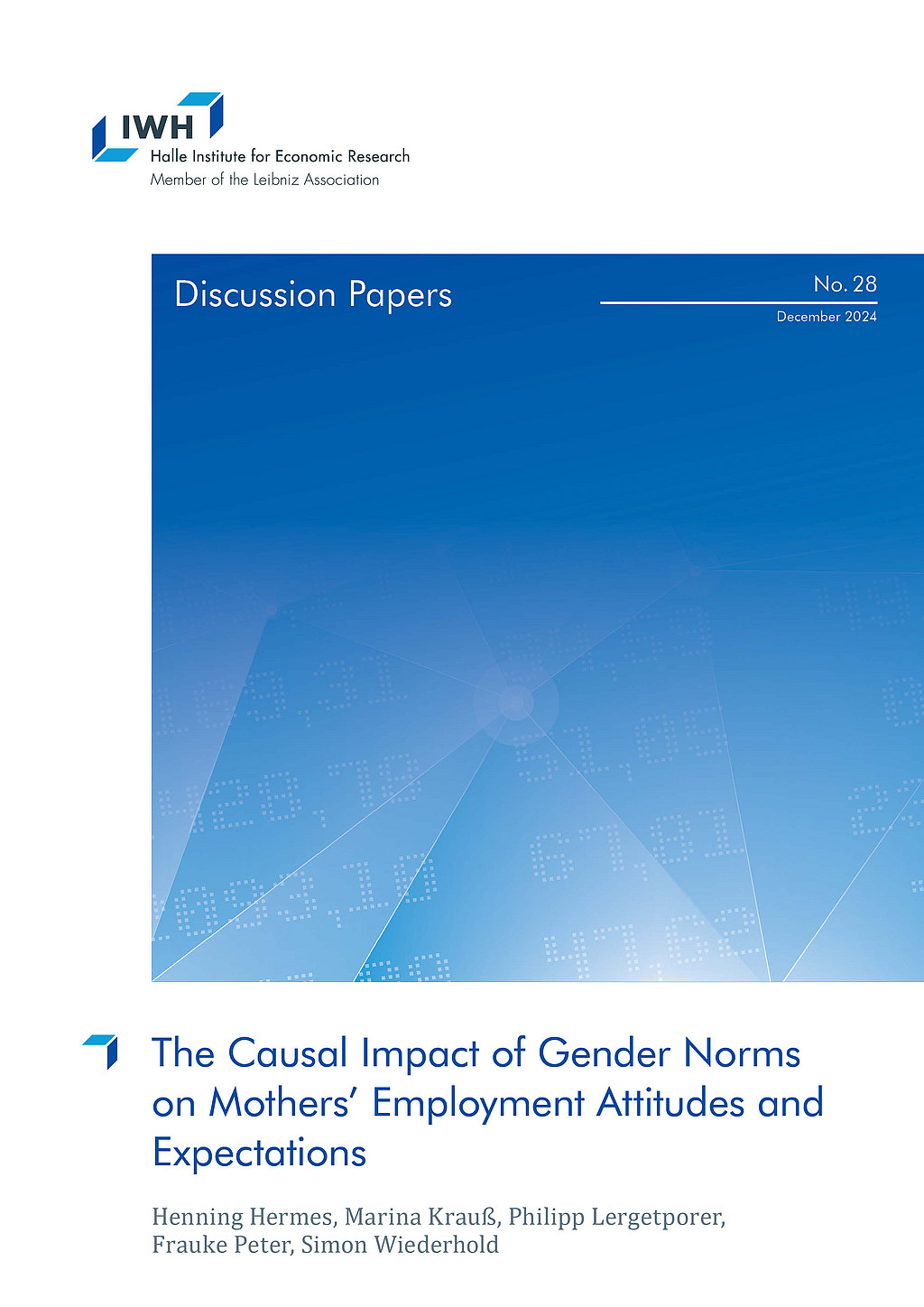
The Causal Impact of Gender Norms on Mothers’ Employment Attitudes and Expectations
in: IWH Discussion Papers, Nr. 28, 2024
Abstract
<p>This field experiment investigates the causal impact of mothers’ perceptions of gender norms on their employment attitudes and labor-supply expectations. We provide mothers of young children in Germany with information about the prevailing gender norm regarding maternal employment in their city. At baseline, over 70% of mothers incorrectly perceive this gender norm as too conservative. Our randomized treatment improves the accuracy of these perceptions, significantly reducing the share of mothers who misperceive gender norms as overly conservative. The treatment also shifts mothers’ own labor-market attitudes towards being more liberal – and we show that specifically the shifted attitude is a strong predictor of mothers’ future labor-market participation. Consistently, treated mothers are significantly more likely to plan an increase in their working hours one year ahead.</p>
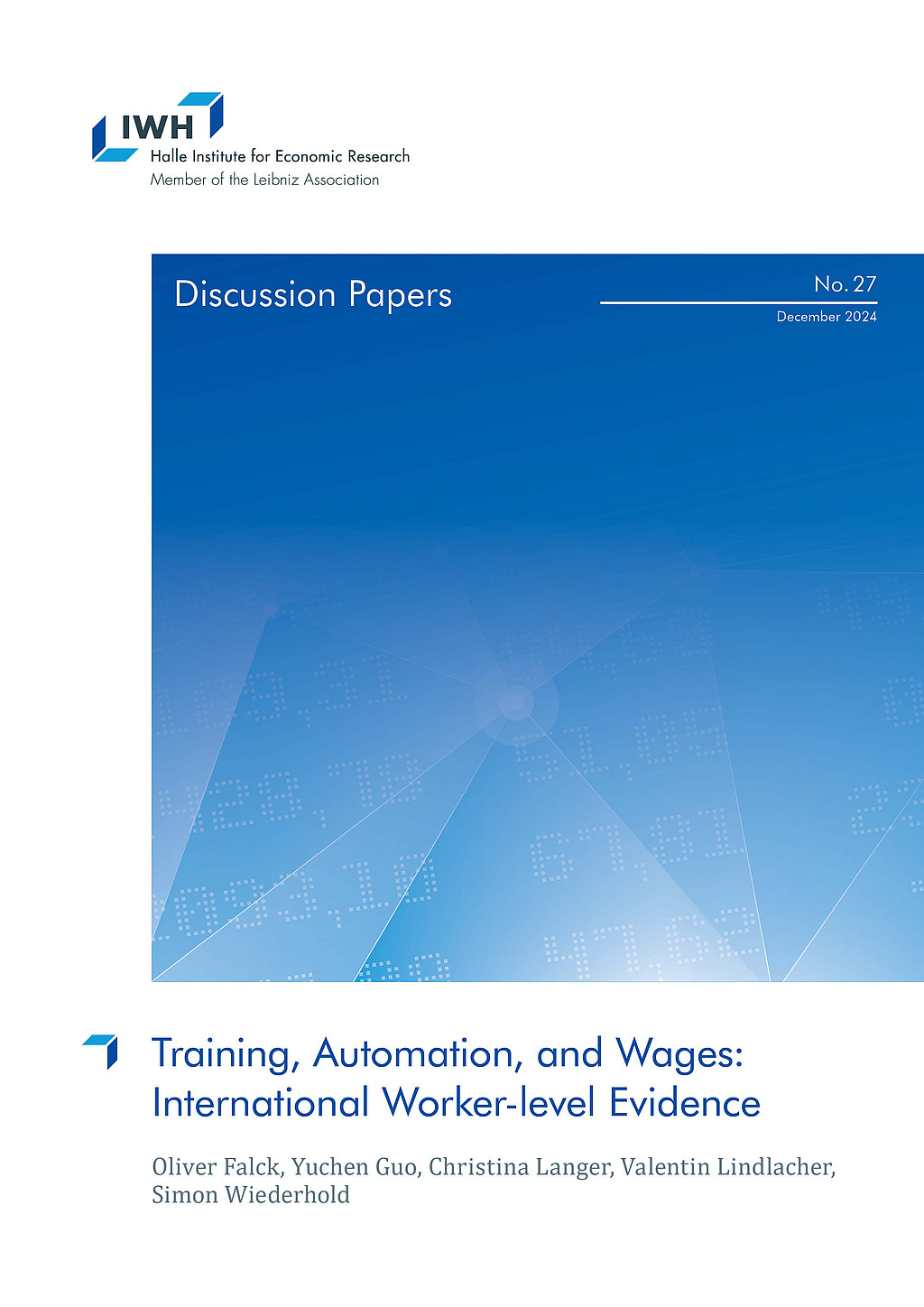
Training, Automation, and Wages: International Worker-level Evidence
in: IWH Discussion Papers, Nr. 27, 2024
Abstract
<p>Job training is widely regarded as crucial for protecting workers from automation, yet there is a lack of empirical evidence to support this belief. Using internationally harmonized data from over 90,000 workers across 37 industrialized countries, we construct an individual-level measure of automation risk based on tasks performed at work. Our analysis reveals substantial within-occupation variation in automation risk, overlooked by existing occupation-level measures. To assess whether job training mitigates automation risk, we exploit within-occupation and within-industry variation. Additionally, we employ entropy balancing to re-weight workers without job training based on a rich set of background characteristics, including tested numeracy skills as a proxy for unobserved ability. We find that job training reduces workers’ automation risk by 4.7 percentage points, equivalent to 10 percent of the average automation risk. The training-induced reduction in automation risk accounts for one-fifth of the wage returns to job training. Job training is effective in reducing automation risk and increasing wages across nearly all countries, underscoring the external validity of our findings. Women tend to benefit more from training than men, with the advantage becoming particularly pronounced at older ages.</p>

Training, Automation, and Wages: International Worker-level Evidence
in: CESifo Working Papers, Nr. 11533, 2024
Abstract
<p>Job training is widely regarded as crucial for protecting workers from automation, yet there is a lack of empirical evidence to support this belief. Using internationally harmonized data from over 90,000 workers across 37 industrialized countries, we construct an individual-level measure of automation risk based on tasks performed at work. Our analysis reveals substantial within-occupation variation in automation risk, overlooked by existing occupation-level measures. To assess whether job training mitigates automation risk, we exploit within-occupation and within-industry variation. Additionally, we employ entropy balancing to re-weight workers without job training based on a rich set of background characteristics, including tested numeracy skills as a proxy for unobserved ability. We find that job training reduces workers’ automation risk by 4.7 percentage points, equivalent to 10 percent of the average automation risk. The training-induced reduction in automation risk accounts for one-fifth of the wage returns to job training. Job training is effective in reducing automation risk and increasing wages across nearly all countries, underscoring the external validity of our findings. Women tend to benefit more from training than men, with the advantage becoming particularly pronounced at older ages.</p>
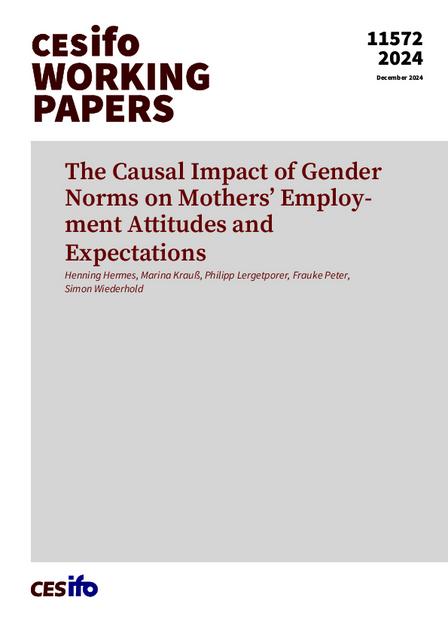
The Causal Impact of Gender Norms on Mothers’ Employment Attitudes and Expectations
in: CESifo Working Papers, Nr. 11572, 2024
Abstract
<p>This field experiment investigates the causal impact of mothers’ perceptions of gender norms on their employment attitudes and labor-supply expectations. We provide mothers of young children in Germany with information about the prevailing gender norm regarding maternal employment in their city. At baseline, over 70% of mothers incorrectly perceive this gender norm as too conservative. Our randomized treatment improves the accuracy of these perceptions, significantly reducing the share of mothers who misperceive gender norms as overly conservative. The treatment also shifts mothers’ own labor-market attitudes towards being more liberal – and we show that specifically the shifted attitude is a strong predictor of mothers’ future labor-market participation. Consistently, treated mothers are significantly more likely to plan an increase in their working hours one year ahead.</p>
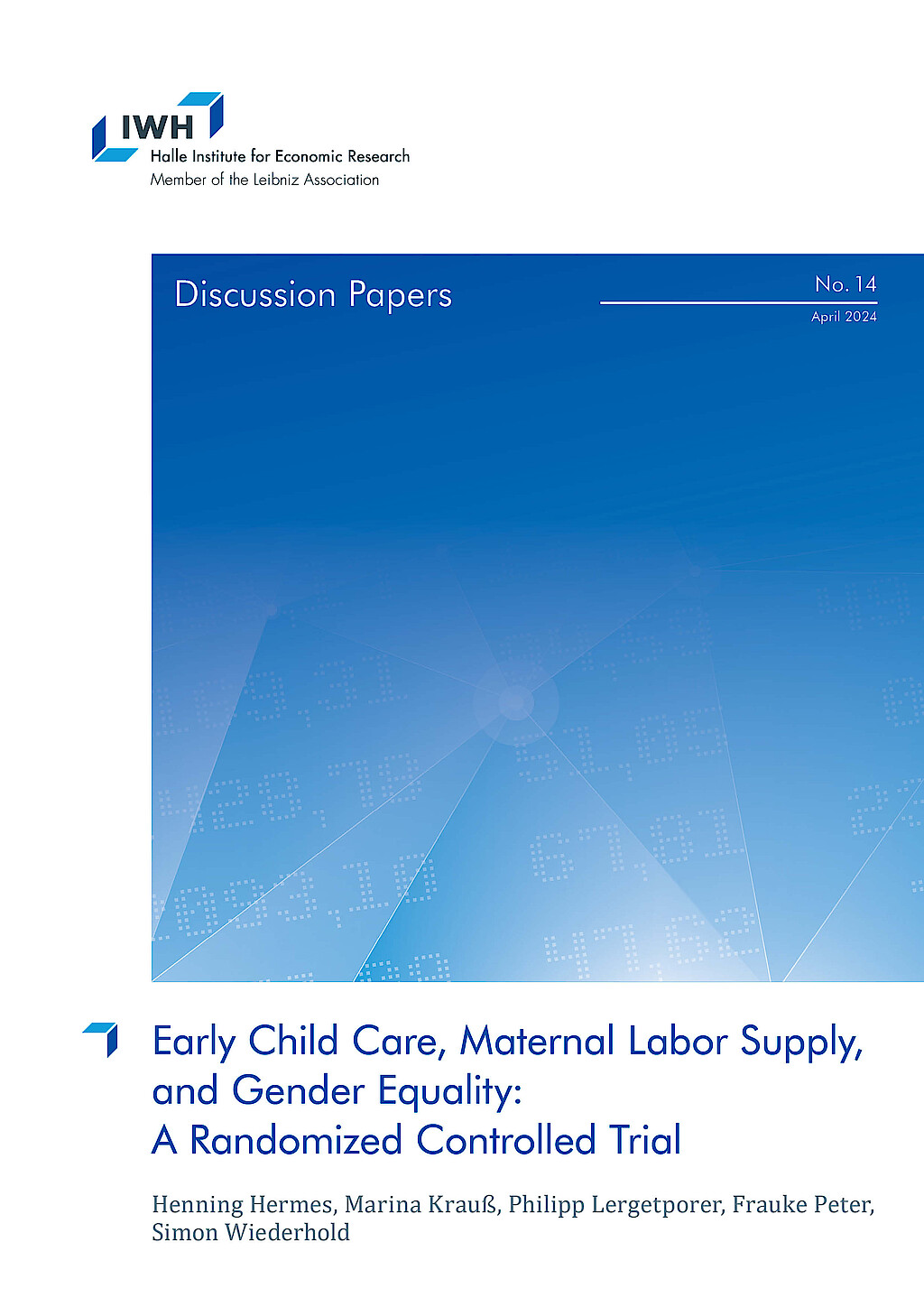
Early Child Care, Maternal Labor Supply, and Gender Equality: A Randomized Controlled Trial?
in: IWH Discussion Papers, Nr. 14, 2024
Abstract
We provide experimental evidence that enabling access to universal early child care increases maternal labor supply and promotes gender equality among families with lower socioeconomic status (SES). Our intervention offers information and customized help with child care applications, leading to a boost in child care enrollment among lower-SES families. 18 months after the intervention, we find substantial increases in maternal full-time employment (+160%), maternal earnings (+22%), and household income (+10%). Intriguingly, the positive employment effects are not only driven by extended hours at child care centers, but also by an increase in care hours by fathers. Gender equality also benefits more broadly from better access to child care: The treatment improves a gender equality index that combines information on intra-household division of working hours, care hours, and earnings by 40% of a standard deviation, with significant increases in each dimension. For higher-SES families, we consistently observe negligible, insignificant treatment effects.













